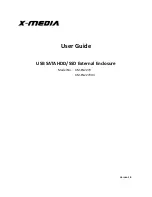
EF3015 Setup Guide (Rev A)
17
3
Connecting Hosts
3.1
Host System Requirements
Hosts connected to an EF3015
controller enclosure must meet the following requirements:
If fault tolerance is required, then multipathing software may be required. Host-based
multipath software should be used in any configuration where two logical paths
between the host and any storage volume may exist at the same time. This would
include most configurations where there are multiple connections to the host or
multiple connections between a switch and the storage.
• For Windows Server 2003, use the MPIO DSM available from DDN Support.
• Use native Microsoft MPIO DSM support with
Windows Server 2008
. Use either the
Server Manager or the command line interface (
mpclaim
CLI tool) to perform the
installation.
See the following web sites for information about using native Microsoft MPIO DSM:
http://support.microsoft.com/gp/assistsupport
(search the site for “multipath I/O overview”)
• To prevent
Microsoft Windows 2003
hosts from displaying the Found New Hardware
Wizard when the storage system is discovered, install the SCSI Enclosure Services
driver available from DDN Support.
NOTE :
The SCSI Enclosure Services driver is
required
for Windows Server 2003.
3.2
Cabling Considerations
Common cabling configurations address hosts, controller enclosures, drive enclosures, and
switches. Cabling systems to enable use of the licensed AssuredRemote™ feature — to
replicate volumes — is yet another important cabling consideration. See
Two Storage Systems to Replicate Volumes"
for more information.
Fibre Channel ports can connect to Fibre Channel hosts; or be used with AssuredRemote for
replication (licensed option).
3.3
Connecting the Enclosure to Hosts
A
host
identifies an external port to which the storage system is attached. Cable connections
vary depending on configuration. This section describes host interface protocols supported
by EF3015 controller enclosures, while showing a few common cable configurations.
















































